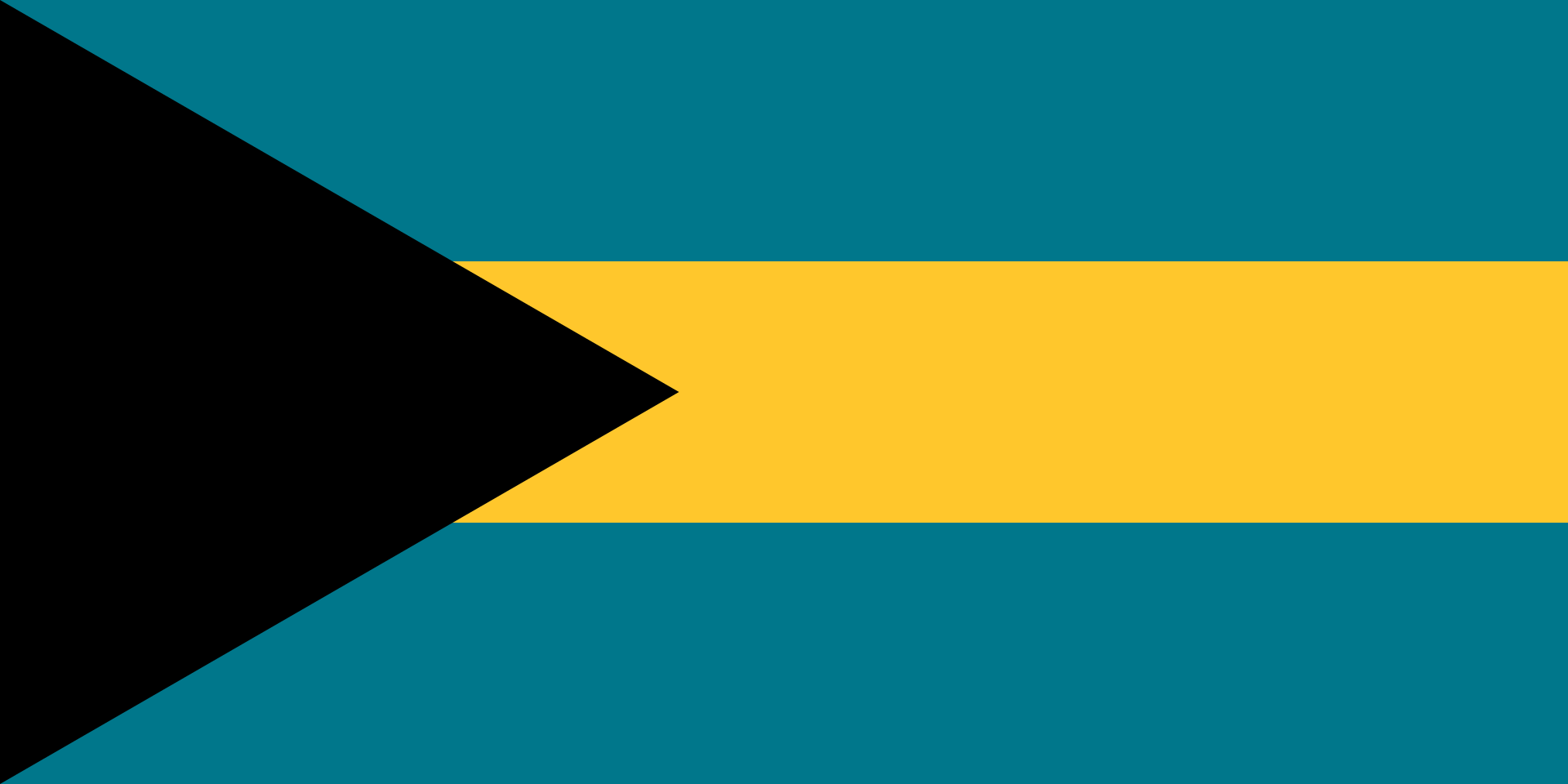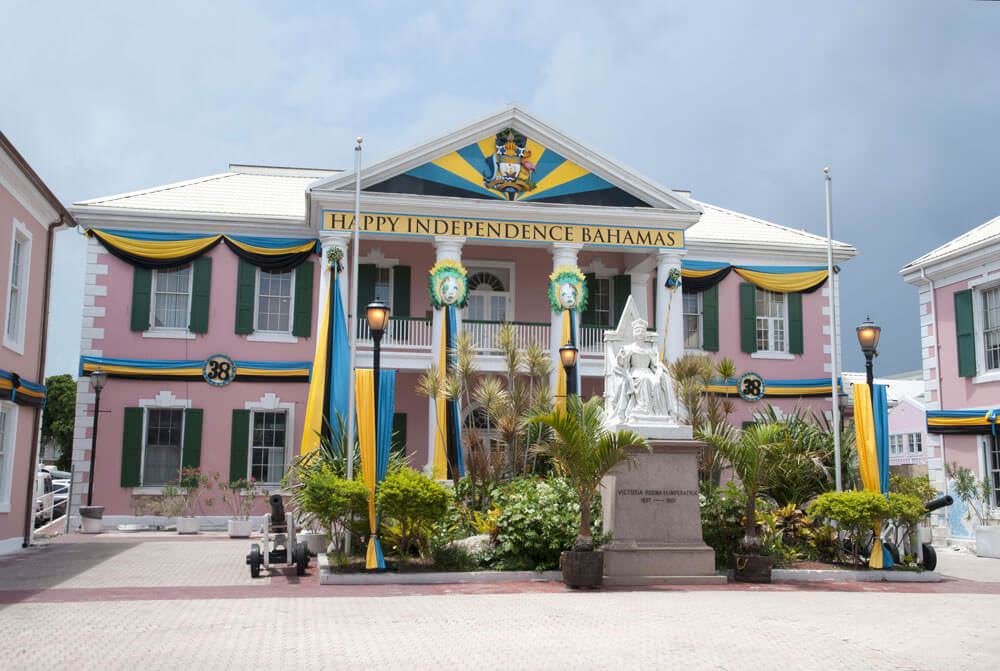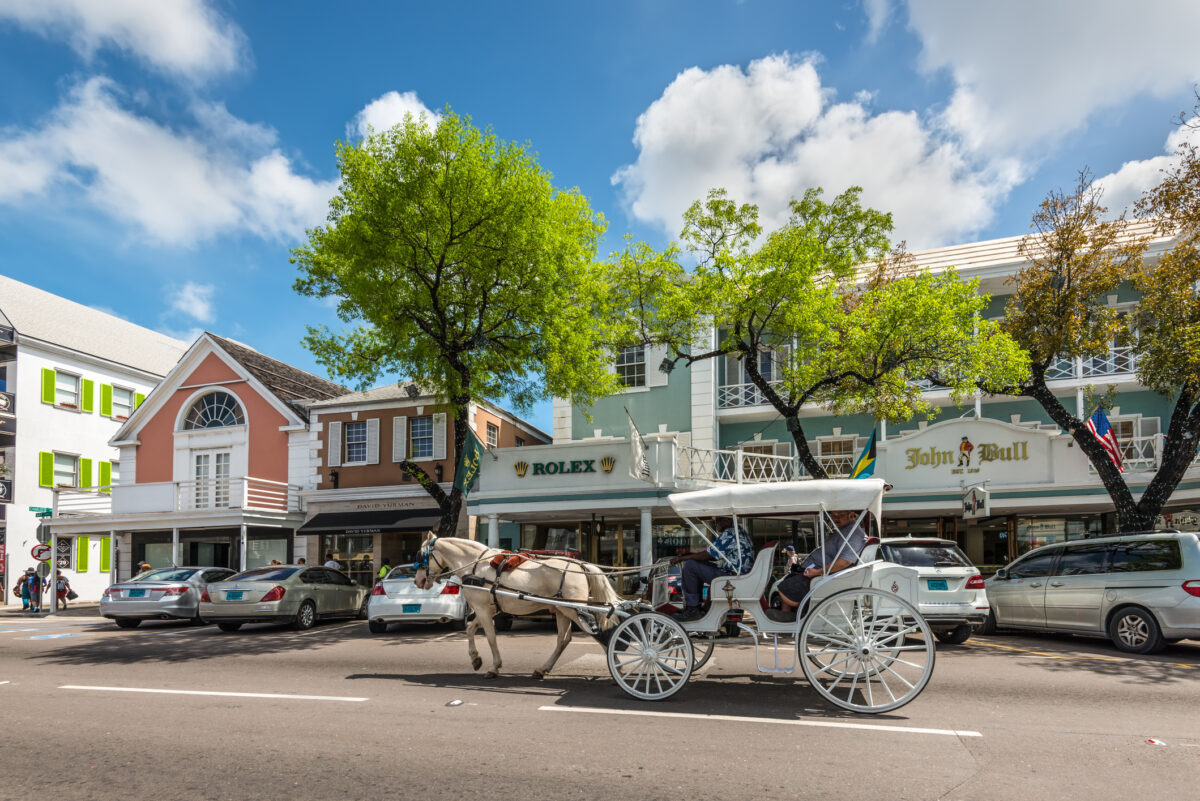The Bahamas

Capital city: Nassau
Population: 396,913 (2021 est.)
Land area: 13,878 km²
Official language: English
Legal system: English common law
Time zone: GMT-4
Currency: Bahamian dollar (BSD)
GDP: 12.60 USD Billion (2021 est.)
Main industries: Tourism, banking, cement, oil transshipment, salt, rum, aragonite, pharmaceuticals, spiral-welded steel pipe
Principal exports: Mineral products and salt, animal products, rum, chemicals, fruit and vegetables
Situated 80 km to the north of Cuba and 100 km southeast of Florida, USA on the Atlantic Ocean, the Bahamas is an archipelago of approximately 700 islands and over 2,000 cays located within the Lucayan Archipelago, spread out over 800 km in width with an overall land area of 13,878 kmsq. The capital of Nassau is the political centre and commercial hub of the nation, located on the island of New Providence. New Providence and its proximate islands are collectively called the “Out (Family) Islands” including the Grand Bahama, one of the most populated islands; Andros, the largest island in terms of land area; the Great Abaco and Eleuthra. Other notable islands include the western district of Bimini, Cat Island, Crooked Island and Mayaguna.
The Bahamas’ territory occurs naturally on an expanse of fossilised coral and the abundance of oolitic limestone is derived from the decomposed coral reefs and seashells. The nation’s topography is often described as an asymmetrical plateau with only a few feet in elevation; Mount Alvernia on Cat Island is the highest point of the whole nation, reaching just under 207 feet in height. Unfortunately, this makes the Bahamas rather vulnerable to rising sea levels. Approximately half of the country is covered with forests of mangroves and swamps, owing to its tropical savannah climate all year round. The unique ecoregion of pineyards can be found on the northern islands of Grand Bahama, Great Abaco, New Providence and Andros and tropical hardwood trees can be found in a few of the low-lying southern islands including Inagua and Exumas. The Caribbean nation is considered a “hotspot” of biodiversity with almost 220 different subspecies of birds and over 1,350 species of flowering plants and ferns; black olive, casuarina, cascarilla, cork tree, manchineel, pimento, and seven species of palm trees are native to the region.

Demographics
Estimates in 2021 pegged the population of The Bahamas at approximately 407,906, ranking it as the 8th most populous in the Caribbean region. The nation is highly urbanized, with 83.6% of the population residing in urban settlements; the densest settlement is located in the capital of Nassau. The Bahamas has a rapidly aging population, with 36% of citizens under the age of 25.
90.6% of Bahamians are of African descent while 4.7% are Caucasian and 2.1% are of mixed ethnicities. English is the official language spoken by over 95% of the population; more widely spoken than English is the lingua franca, Creole. The predominant religion is Christianity, the major denominations followed include Protestantism (69.9%) and Catholicism (12.0%). Other schools of Christianity, including the Anglican, Methodist and Seventh Day Adventist schools, constitute the religion of 13.0% of the population whilst the remaining citizens identify with several other religions including Islam, Hinduism and Judaism.
History
The Bahamas were first inhabited by the Lucayans, an Arawak-speaking people who lived on the islands for over 1,000 years. They were skilled fishermen, farmers, and traders, with a complex social hierarchy and cultural traditions that included art, music, and storytelling. The Lucayans were likely related to other indigenous groups in the Caribbean, such as the Taino of Hispaniola; they lived in small villages, often located near the coast or inland waterways and relied on fishing and agriculture for their livelihoods, growing crops such as cassava, maize, and sweet potatoes. The Lucayans were skilled craftsmen, making pottery, baskets, and other items from natural materials. They had a complex religious and social system, with chiefs, priests, and warriors.
Christopher Columbus was the first European to visit The Bahamas, during his first voyage to the Americas in October 1492. He called the islands “Baja Mar” (shallow sea) and claimed them for Spain. The Spanish made several attempts to settle the islands, but they were unsuccessful due to disease, hurricanes, and attacks from the Lucayan people. The Lucayans were forced into slavery and by the mid-16th century, the indigenous population was nearly wiped out. In the early 17th century, the islands became a popular spot for pirates, who used them as a base to attack Spanish ships. The British took notice of the territory in 1629 though they did not arrive on the islands until late 1648 when Bermudan missionaries and governor of Bermuda, Captain William Sayle, set sail for the islands to see if it could be used as a place for worship; their trip truned out unsuccessful due to adverse weather conditions and hostility from the Spaniards. Bermudans once more set sail for the territory in 1666 and by 1670 the island of New Providence became the seat of government for Sayle and the duke of Albermarle who acquired a grant of the island from King Charles II. New Providence was a sheltered harbor with one of the most sizeable settlements but despite these developments the leadership remained rather apathetic to the governance of the region, leading to it gradually becoming a haven rather for pirates targeting the Spanish (initially though later factions targeted any loot-worthy vessel), particularly the notorious Black Beard.
Due to the rampant raids orchestrated by the Spanish in retaliation, official representatives urged direct control from the crown. By the early 18th century, the kingdom had decided to implement a forceful rule and drive out the pirates; in 1718, Captain Woodes Rogers was appointed the first royal governor and arrived on the island with a troop of soldiers. While majority of the pirates surrendered and were pardoned by the King, the 8 who defied were hung. In 1729, Rogers was given the authority to set up a representative assembly due to which governance of the colony became stable. British control remained consistent until 1782 when the colony was surrendered to Spain; however, the Spanish rule lasted for little less than a year as British control was restored following the Peace of Paris treaty in 1783. In the aftermath of the American Revolution, many loyalists from the United States migrated to the Bahamas and were consequently given generous concessions by the crown. These migrants brought along their plantation labourers consequently hiking up the population of the Bahamian islands and though they were put to work in cotton plantations initially, infertile soil and infestations followed by the abolition of slavery in 1838, the plantations ultimately collapsed. Emancipated labourers then turned to subsistence farming or opted to remain employed on their ex-landlords’ land on the share system basis. Trial runs for growing citrus fruits, tobacco, tomatoes and sisal as export crops failed and eventually sponge fishing also collapsed in 1938.
Full internal self-governance was given to Bahamians early on as they already had considerable control of their affairs since the establishment of the first assembly in 1729. A new constitution for the island was reconsidered during a London conference in May 1963 which promulgated full local control of all government matters aside from foreign affairs and national defense; the proposed constitution was formally enforced on 7 January 1964. General elections were held in 1967, in which the Progressive Liberal Party (PLP), a group of African-descent politicians led by Lynden Pindling, won slight majority over the British-descendant majority United Bahamian Party (UBP). The PLP was an advocate of firm governmental control of Bahamian economic affairs, encouraging more Bahamian ownership of businesses and local workers, and made it a goal to achieve full self-independence by 1973. In 1969, the territories were officially renamed as the “Commonwealth of the Bahama Islands” and ultimately, on 10 July 1973, upon independence were once again renamed to “The Commonwealth of The Bahamas”. The PLP remained in government post-independence. Anti-independence ex-PLP members formed a coalition with the UBP to form the Free National Movement just a year prior to independence; they became the main opposition in government until 1992 when they won the August 1992 elections.
Key Dates
1492 Christopher Columbus arrives at the Western Hemisphere
1666 Foreign settlement New Providence Island begins
1717 The Bahamas become a British crown colony
1783 The Bahamas ceded to Britain in accordance with the Treaty of Paris
1940-45 The Duke of Windsor instated as governor of the Bahamas
1955 230 square mile free trade Zone called Freeport established marking the beginning of tourism and attracting offshore banking.
1967 Progressive Liberal Party (PLP) leader Lynden Pindling wins the first legislative elections, becoming Prime Minister.
1972 The PLP slogan of independence coupled with its electoral victory sparks demand for negotiations with Britain for independence.
1973 The Bahamas gain independence on 10th of July
1992 Centre-left party called the Free National Movement (FNM) wins the 1992 elections with absolute majority: effectively ending Pindling’s 25-year rule. He is replaced by Ingraham.
1997 Ingraham returns as prime minister after being re-elected for a second term.
2000 Sir Lynden Pindling dies on the 26th of August
2002 Progressive Liberal Party leader and veteran politician Perry Christie leads his party to victory, unseating the Free National Movement, which has been in power for 10 years.
2007 Ingraham’s Free National Movement wins parliamentary elections.
2012 Perry Christie returns to power once again as the Progressive Liberal Party wins parliamentary elections. Ingraham announces retirement from politics.
Legal System and Government
As a member of the Commonwealth of Nations the Bahamas recognizes King Charles III as Head of State. The Governor-General is his representative. The Cabinet constitutes the executive branch and has general direction and control of the Government of The Bahamas. It is necessary for the Cabinet to comprise at least nine Ministers inclusive of the Prime Minister and Attorney General. Parliament constitutes the Legislative branch of The Bahamas, which consist of a Senate and a House of Assembly. Judicial Authority is vested in the Judicature which consists of the Supreme Court and the Court of Appeal.
English common law forms the basis of the Bahamas’ judicial system. The Court of Appeal is the highest court in the country, which is made up of three judges. Supreme Court is composed of a chief justice, two senior justices, and six justices. The governor-general appoints the members of the high court. The United Kingdom’s Privy Council hears the last appeals.

Economy
The Bahamas is a high income developed country with a market economy led by tourism and offshore banking. The Bahamas is the wealthiest country in the West Indies and has the 14th highest nominal GDP in North America. For foreign exchange revenue, the Bahamas’ economy is nearly exclusively reliant on tourism and financial services. Tourism, and manufacturing and construction for the purpose of tourism and hospitality services, accounts for half of the Bahamian workforce and generates an estimated 60% of the country’s gross domestic product (GDP). Due to the country’s role as an offshore financial center, financial services are the second-largest sector of the Bahamian economy, contributing for up to 17% of GDP.
Agricultural products grown in The Bahamas include roots, tubers, citrus fruits, hot peppers, onions, coconuts and livestock farming; the government hopes to increase agricultural production by harnessing the success of agro-tourism and agribusiness development across the islands. As of now, the agricultural sector contributes 1.6% of GDP and employs 3% of the labour force.
Trade
The Bahamas’ GDP was recorded to be US$11.21 billion in 2021. In the same year, the top export commodities included ships, boats and other floating structures (31.6%), mineral fuels, oils and products of their distillation (25.3%), fish, crustaceans, molluscs and other aquatic invertebrates (10.0%) and plastics and articles of plastic (6.4%). The main market for Bahamian export commodities for 2021 was the United States (79.1%) followed by France (6.2%) and the Turks and Caicos Islands (3.9%). In terms of imports for 2021, the Bahamas largely imported mineral fuels, oils and products fo their distillation (35.7%), ships, boats and other floating structures (20.9%) and machinery, mechanical appliances, nuclear reactors and boilers (4.1%). These were largely sourced from the United States (79.8%), Canada (2.3%) and the Turks and Caicos Islands.
The Bahamas has been a member of the Caribbean Community (CARICOM) since 1983 and is also a signatory of the Economic Partnership Agreement (EPA) between the United Kingdom and the Caribbean Forum (CARIFORUM) member states.
Investment Opportunities
The Bahamas has a peaceful and stable democratic environment with a strong commitment to the rule of law and has been noted by the World Bank to be amongst the most improved in three or more “Doing Business In” categories, although there is much improvement needed as it still ranks overall 119 globally. The country offers relief from taxes on personal income, inheritance, capital gains, corporate income and other taxes related to dividends and interest. The Bahamas is also a member of economic blocs such as Caribbean Community (CARICOM) and Economic Partnership Agreement (EPA) between the CARICOM, EU, and UK. The city of Freeport on the island of Grand Bahama is to remain a Free Trade Zone until 2054 and businesses therein may enjoy many tax exemptions and added incentives. Ministry of Financial Services, Trade and Industry and Immigration (MFSTII) is planning to exponentially increase rum exports and is calling for foreign investment stating that there are many lucrative opportunities for the manufacturing and processing sectors in this industry.
Sources
https://www.britannica.com/place/The-Bahamas/Independence
https://www.bbc.com/news/world-latin-america-18723547
https://www.nationsencyclopedia.com/Americas/The-Bahamas.html
https://www.cbd.int/countries/profile/?country=bs
https://www.myoutislands.com/bahamas-resorts/culture
https://reliefweb.int/report/bahamas/bahamas-country-profile-may-2022
https://www.bahamas.com/events/junkanoo
https://www.cia.gov/the-world-factbook/countries/bahamas-the/#people-and-society
https://www.cardi.org/country-offices/bahamas/
https://publications.iadb.org/en/analysis-agricultural-and-fisheries-policy-bahamas
https://tradingeconomics.com/bahamas
https://santandertrade.com/en/portal/establish-overseas/bahamas/investing-3
https://www.trade.gov/country-commercial-guides/bahamas-market-overview
https://thenassauguardian.com/move-to-significantly-increase-local-rum-exports/